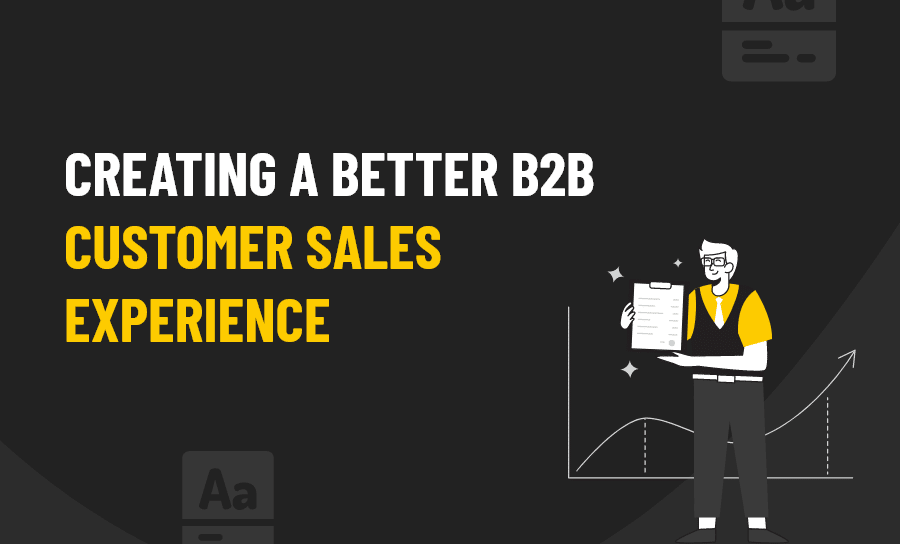WHY THE B2B CUSTOMER EXPERIENCE IS SO IMPORTANT
We should all be trying to create better B2B Customer Experiences.
But why is it so important?
Being a consumer today means being in control of your transactions. You know exactly what you want when you want it and how much you want to pay.
We’re all making different choices as consumers as we rely more on how we feel about a brand and its ethos, as opposed to jumping at the first offer of sale.
The customer experience is one of the BIGGEST defining factors in our buying decisions.
This is no less true for B2B services than it is for B2C. B2B buyers face the same decisions we all do and use similar parameters for decision making. The cost-effectiveness and return on investment will, of course, play a large role, but it’s just as important to optimize your customer experience.
According to research by B2B International, only 14% of large B2B companies are truly customer-centric. That means that the customer experience is built into the fabric of their company.

Photo credit: B2B International
This shows that there are large steps to be taken in the industry to ingratiate the customer experience.
It’s also clear that you can make waves and stand out amongst your competitors by making a push to become more customer-centric.
It’s not just the customers who benefit from this work, it’s you. There truly is no one size fits all template to B2B marketing success, but the one thing that always matters and always gets results is the customer experience.
B2B buyers are quick to reward companies that are easy to buy from and fast to respond when issues arise.
It should affect every component of your customer-facing work and the teams behind it. If you can prioritize the customer experience, you’ll see the benefits almost immediately.
It’s easy enough to talk about it, but how can this be put into practice? What are some actionable steps you can take to end up on the right side of the customer equation?
At Pearl Lemon Sales, the customer experience is always a crucial factor with our outsourced sales team, so we know a few things about how to optimise the B2B customer experience.
Whilst our tips are by no means exhaustive, we’ve put together some clear tactics that will elevate the quality of your customer experience in no time and help generate more B2B sales.
SOCIAL MEDIA
THOUGHT LEADERS ARE IMPORTANT
There’s a reason you hired the people on your team. They know their stuff. You believe in them. You trust them.
Here’s the thing: other people will too.
It’s something that a lot of B2B companies overlook, as they believe their brand-focused website messaging is all they need.
To a prospect, nothing is more compelling than knowing that you’re buying from a trusted source, with an authority thought leader at the helm.
Are your directors contributing to any content that’s relevant to their skillset? They should be.
If they’re showcasing their expertise, how they deliver solutions, their personal journey to their current position, and representing your brand alongside, B2B buyers will listen.
By positioning your executives as thought leaders in their relevant, respective focuses, you will appeal to your prospects, and boost the reputation your company holds by association.
This is a hugely effective way to appeal to a B2B customer base, where proven knowledge and personal achievement can speak louder than even the most finely tuned sales pitch.
CHATBOTS

Photo Credit: Acquire.io
Chatbots are set to take over the marketing game.
These are programs that can be installed on your landing page and emulate person-to-person contact.
They can sift through your website to find optimal solutions to something your customer needs. This can be a service you have to offer, the campaign you’ve been promoting, or a targeted question in your Q&A.
But that’s not all!
This technology can be used for a multitude of purposes, from inbound marketing to customer service. With the right automation platform, a chatbot can book product demos, generate customer feedback and discover new leads and they can keep going 24/7.
B2B customer service is all about efficiency and clarity, and a chatbot can help guide a prospect through the, often long, B2B customer journey.
Demand Gen Report has found that B2B buyers are spending 45% more time researching prospective services. It’s an arduous process with many decisions at every step.
A chatbot is a hugely important tool to the B2B buyer customer experience as it speeds up the process, whilst making the customer feel that their prospective business is still valued..
A buyer can use it to find the worth of your website, without losing time trying to find it. They can answer any questions they may have, and if a human representative is needed, the chatbot can gather the appropriate information and speed up the response time by forwarding it to the correct person.
There are numerous chatbot platforms available, and they’re being tweaked and upgraded all the time. That being said, some industry favourites include; Drift, Aivo, and Flow XO.
CASE STUDIES AND TESTIMONIALS
Breaking through the noise that overwhelms B2B buyers on a daily basis can be difficult. It’s a competitive market and being flooded with sales pitches from every angle can put buyers guard up.
So how do you break through this noise?
With customer testimonials.
An unbiased customer voice can make more of an impact than even the most tightly optimised landing page. It also shows that you have outreach amongst your customer base, you listen to their feedback and you trust their input.
It’s been shown that 97% of B2B customers cited testimonials and peer recommendations as the most reliable type of content. Part of why this is the case is because it highlights the relatable, human side of your service.
Having real people as your brand advocates is not just one of the most effective, organic outreach techniques. They are also a customer base likely to buy additional products or services from you.
When you reach out for a testimonial or case study, don’t focus solely on the statistics that back-up the effectiveness of your service, ask how the customer felt when they were contacted, how the team worked with them to structure a tailored plan, how the customer feel valued.
These insights will engage new prospects by showcasing your attitude to the people who buy from you.
DON’T FORGET YOUR CUSTOMER AFTER THE SALE

Speaking of the people who buy from you…
One key component to a better customer experience is keeping the communication post-delivery strong.
Don’t forget your customer after the sale.
It’s been said that a satisfied existing customer is ten times more valuable than a prospective one, and this remains the case today.
Happy customers will tell other customers how happy they are!
Strengthening your relationships with buyers after the sale is crucial, and one of the best ways to provide an unparalleled B2B customer experience. By serving your existing customers, you can ensure their continued loyalty.
Nurturing these relationships won’t just help retain your customers, you can also obtain valuable analysis on how your purchase cycle works for a third party.
You can generate tailored email campaigns providing information on industry trends and data insight, send invitations to webinars and tailor offers to returning customers. Anything that can offer value to the customer even after the sale is complete.
Feedback should also come into play here.
To ensure that your services are continually providing the best customer experience, you need to actively listen to what they have to say.
Collecting qualitative data through feedback forms is an easy way to bring conclusive figures back to your strategic team, whilst reminding the customer that their opinion actually matters.
If you commit to maintaining a channel of communication with your previous clients, you can provide a complete wraparound customer experience, whilst also tapping into a customer base who are much more likely to make return purchases for additional services.
Never underestimate the importance of creating better B2B customer experiences. It’s not just the key to generating a more consistent stream of new sales, it’s a defining factor in creating a brand with a legacy.
If you’re still finding it difficult to build an effective sales strategy, taking customer experience into account, why not reach out to us at Pearl Lemon Sales? We’re an all-in-one, award-winning sales agency and can offer packages in sales strategy, or can even provide an outsourced sales team who work alongside your company ethos and goals to deliver the results you need.
If you’re wondering how we can support your targets, don’t hesitate to get in touch. We’d love to help by becoming your outsourced sales team!
faqs
While customer experience in B2B may seem unimportant, it is vital if you want to own a profitable business. In the B2B sector, your customers won’t feel beholden to you or excuse your mistakes, especially in highly competitive industries. There are thousands of other companies out there waiting to gain your customers’ trust, and they won’t make the same mistake you do if your customers switch. That is likely a permanent loss for your company which you won’t be able to make up.
Further, not only do you lose the business of your customers, but you potentially lose the business of their entire network. This is one of the reasons why customer experience might be even more critical in the B2B sector than in the B2C sector. The average individual consumer likely has family and close friends whom they’ll vent out to, and their negative reviews will constantly spread among their network and can reach yours. This is more frightening when you consider that 91% of B2B purchases are influenced by word of mouth.
B2B and B2C customer experiences have fundamentally the same concept: making the experience of every customer feel as enjoyable and rewarding as possible. However, some crucial distinctions fundamentally separate B2B customer experience management (CEM) from B2C CEM.
Here are some of the major differences:
- B2B often has more than one decision-maker involved. If you’re trying to convince a business that you have a rewarding customer experience, you’ll have to understand the individual motivations of various decision-makers.
- B2B has more factors to consider. Ease of onboarding, well-timed payment schedules, and customer success are extra variables that you’ll have to factor into your B2B CEM strategy.
B2B can have a much larger scope of interaction with your business. If you’re in a full-scale partnership with your customers, they’ll likely have people interacting with all levels of your business. You must train and check in with every department of your company to ensure you are all on the same page about customer experience.
B2B customers are looking for all the factors we’ve mentioned under the “What is B2B and B2C customer experience?” FAQ, but there’s a central idea at the heart of every B2B transaction. B2B customers will value stability above all else in their purchases. When purchasing a service or product from another business, decision-makers take a massive risk by spending a lot of money. They fundamentally want the assurance that their money and their time spent on your company is being put to good use. If you can deliver consistent, rewarding, and successful results for your customers, your B2B customers will always be happy that they’ve partnered with you.





